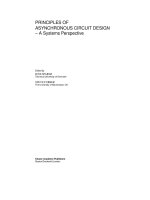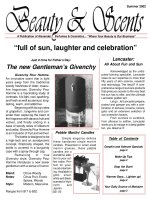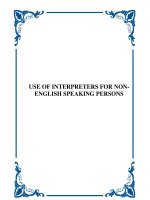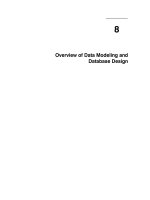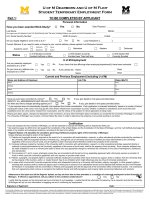Tài liệu BACHELOR OF HOTEL MANAGEMENT AND CATERING TECHNOLOGY (2008-12) pdf
Bạn đang xem bản rút gọn của tài liệu. Xem và tải ngay bản đầy đủ của tài liệu tại đây (412.68 KB, 124 trang )
(With Effect From Session 2008-2009)
1
SCHEME OF EXAMINATION
&
SYLLABI
OF
BACHELOR OF HOTEL MANAGEMENT AND
CATERING TECHNOLOGY
(2008-12)
GURU GOBIND SINGH
INDRAPRASTHA UNIVERSITY
KASHMERE GATE, DELHI-110006
(With Effect From Session 2008-2009)
2
BACHELOR OF HOTEL MANAGEMENT AND CATERING
TECHNOLOGY
FIRST SEMESTER EXAMINATION
Code No. Paper L T/P Credits
bhct 101 Food Production 3 - 3
& Patisserie-I
bhct 103 Front Office Operations -I 3 - 3
bhct 105 Food & Beverage Service -I 3 - 3
bhct 107 Housekeeping Operations-I 3 - 3
bhct 109 Introduction to Book Keeping 3 - 3
& Accounts
bhct 111 Introduction to the Hospitality Mgmt 3 - 3
& Tourism
bhct 113 Business Communication 3 - 3
Practicals/Lab.
bhct 151 Food Production-I - 4 2
bhct 153 Patisserie-I - 2 1
bhct 155 Front Office Operations-I - 2 1
bhct 157 Food & Beverage Service -I - 2 1
bhct 159 Housekeeping -I - 2 1
21 12 27
(With Effect From Session 2008-2009)
3
BACHELOR OF HOTEL MANAGEMENT AND CATERING
TECHNOLOGY
SECOND SEMESTER EXAMINATION
Code No. Paper L T/P Credits
bhct 102 Food Production &
Patisserie-II 3 - 3
bhct 104 Front Office Operations -II 3 - 3
bhct 106 Food & Beverage Service-II 3 - 3
bhct 108 Housekeeping Operations-II 3 - 3
bhct 110 Hygiene ,Sanitation & First Aid 3 - 3
bhct 112 Accountancy for Hospitality Industry 3 - 3
bhct 114 PC Tools for Hospitality Industry-I 3 - 3
Practicals/Lab.
bhct 152 Food Production-II - 4 2
bhct 154 Patisserie-II - 2 1
bhct 156 Front Office Operations-II - 2 1
bhct 158 Food & Beverage Service-II - 2 1
bhct 160 Housekeeping -II - 2 1
bhct 162 PC Tools Lab-I - 2 1
21 14 28
Immediately after the End Term Examinations of Second Semester the
students shall proceed for Summer Training of Ten weeks duration.
(With Effect From Session 2008-2009)
4
BACHELOR OF HOTEL MANAGEMENT AND CATERING
TECHNOLOGY
THIRD SEMESTER EXAMINATION
Code No. Paper L T/P Credits
bhct 201 Food Production &
Patisserie-III 3 - 3
bhct 203 Front Office Operations -III 3 - 3
bhct 205 Food & Beverage Service-III 3 - 3
bhct 207 Housekeeping Operations -III 3 - 3
bhct 209 Food Science & Nutrition 3 - 3
bhct 211 PC Tools for Hospitality Industry-II 3 - 3
bhct 213 Tourism Product ,Services &
Management 3 - 3
bhct 215 Summer Training Report - - 4
bhct 217 Environmental Studies 4 - 4
Practical/lab
bhct 251 PC Tools Lab-II - 2 1
25 2 30
Training Report of Summer Training to be presented during Semester End Exams before the
duly constituted panel comprising of:
1. Institute Representative (Director/Principal or his nominee)
2. Industry Representative ( External Examiner appointed by the Vice – Chancellor)
(With Effect From Session 2008-2009)
5
BACHELOR OF HOTEL MANAGEMENT AND CATERING
TECHNOLOGY
FOURTH SEMESTER EXAMINATION
Code No. Paper L T/P Credits
bhct 202 Food Production &
Patisserie IV 3 - 3
bhct 204 Front Office Operations -IV 3 - 3
bhct 206 Food & Beverage Service- IV 3 - 3
bhct 208 Housekeeping Operations-IV 3 - 3
bhct 210 Hotel Engineering 3 - 3
bhct 212 Material Management & Development 3 - 3
bhct 216 Principles of Management 3 - 3
Practicals/Lab.
bhct 252 Food Production -III - 4 2
bhct 254 Patisserie-III - 4 2
bhct 256 Front Office Operations-III - 2 1
bhct 258 Food & Beverage Service -III - 2 1
bhct 260 Housekeeping-III - 2 1
21 14 28
(With Effect From Session 2008-2009)
6
BACHELOR OF HOTEL MANAGEMENT AND CATERING
TECHNOLOGY
FIFTH SEMESTER EXAMINATION
Code No. Paper L T/P Credits
bhct 301 Food Production &
Patisserie-V 3 - 3
bhct 303 Front Office Operations-V 3 - 3
bhct 305 Food & Beverage Service -V 3 - 3
bhct 307 Housekeeping Operations -V 3 - 3
bhct 309 Research Project Design & Methodology 3 - 3
bhct 311 Hotel Law & Licensing 3 - 3
bhct 313 Facility Planning 3 - 3
Practicals/Lab.
bhct 351 Food Production -IV - 4 2
bhct 353 Patisserie-IV - 4 2
bhct 355 Front Office Operations-IV - 2 1
bhct 357 Food & Beverage Service-IV - 2 1
bhct 359 Housekeeping -IV - 2 1
21 14 28
(With Effect From Session 2008-2009)
7
BACHELOR OF HOTEL MANAGEMENT AND CATERING
TECHNOLOGY
SIXTH SEMESTER EXAMINATION
Code No. Paper L T/P Credits
bhct 302 Functional Exposure Training - 24
- - 24
As per training Programme Designed followed by Project Report and Project Presentation during
Semester End Examination.
Training Report of Sixth Semester Functional Exposure Training to be prepared and presented
before duly constituted panel comprising of:
1. Institute Representative (Director/Principal or his nominee)
2. Industry Representative ( External Examiner appointed by the Vice –
Chancellor/Controller of Examinations)
(With Effect From Session 2008-2009)
8
BACHELOR OF HOTEL MANAGEMENT AND CATERING
TECHNOLOGY
SEVENTH SEMESTER EXAMINATION
Code No. Paper L T/P Credits
bhct 401 Advance Food Production Management-I 3 - 3
bhct 403 Rooms Division Management -I 3 - 3
bhct 405 Advance Food &
Beverage Service Management -I 3 - 3
bhct 407 Advance Housekeeping Operation Mgmt-I 3 - 3
bhct 409 Financial Management - I 3 - 3
bhct 411 Managing Hospitality Human Resources-I 3 - 3
bhct 413 Hospitality Service Marketing & Sales 3 - 3
Practicals/Lab.
bhct 451 Food Production-V - 4 2
bhct 453 Patisserie-V - 4 2
bhct 455 Front Office Operations-V - 2 1
bhct 457 Food & Beverage Service-V - 2 1
bhct 459 Housekeeping -V - 2 1
21 14 28
(With Effect From Session 2008-2009)
9
BACHELOR OF HOTEL MANAGEMENT AND CATERING
TECHNOLOGY
EIGHTH SEMESTER EXAMINATION
Code No. Paper L T/P Credits
bhct 402 Advance Food Production Mgmt-II 3 - 3
bhct 404 Advance Rooms Division Mgmt-II 3 - 3
bhct 406 Advance Food & Beverage Services
Management -II 3 - 3
bhct 408 Entrepreneurship Development &
Business Strategies 3 - 3
bhct 410 Financial Management-II 3 - 3
bhct 412 Managing Hospitality Human Resources-II 3 - 3
bhct 414 Integrated Marketing Communication 3 - 3
Practicals/Lab.
bhct 452 Advance Food Production - 4 2
bhct 454 Advance Front Office Operations
Management - 2 1
bhct 456 Advance Food & Beverage Operations
Management - 2 1
bhct 458 Advance Housekeeping Operations
Management - 2 1
bhct 460 *Project Report - 2 4
21 12 30
*The Project Report should be Market Research and Field Work oriented
and related to the Core Area/other departments, strategies, policies,
planning, performance, trend of Hotel & Hospitality Industry & Operations.
The Documentation and Presentation should be conducted during Term End
Examination before duly constituted panel comprising of:
1. Institute Representative (Director/Principal or his nominee)
2. Industry Representative ( External Examiner appointed by the
Vice – Chancellor/ Controller of Examinations)
(With Effect From Session 2008-2009)
10
Note: The Total Credits of the BHMCT Programme is 223 credits. Each
student should compulsorily be required to register himself / herself for
all the courses of the programme and should therefore also appear in the
Examination of all courses of the programme. The students would be
eligible for the award of the degree if he/she is able to earn a minimum
of 212 credits and he or she has successfully completed the courses on
Summer Training Report (bhct – 215),
Functional Exposure Training Report (bhct – 302) and
Project Report (bhct- 460).
(With Effect From Session 2008-2009)
11
BACHELOR OF HOTEL MANAGEMENT AND CATERING TECHNOLOGY
FIRST SEMESTER
FOOD PRODUCTION & PATISSERIE -I
Course code : bhct 101 L-3 T/P – 0 Credits-3
UNIT-I
INTRODUCTION TO PROFESSIONAL COOKERY
Culinary History and Origin of modern cookery practices.
Aims and objectives of cooking
Mis-en-Place and methods of mixing ( Beating, Blending, Rubbing, Creaming, Folding, Stirring,
Rolling)
Texture-faults and remedies.
Essentials of Continental food preparation
Essentials of Indian food preparations
Hygiene & safe practices in handling food
UNIT –II
METHODS OF COOKING
Various Methods of cooking ( Moist, Dry, Frying, microwave cooking)
Microwave cooking advantage & Disadvantage
Time and temperature,
Effect of cooking on food items & nutrients,
Care & Precautions to be taken,
UNIT-III
KITCHEN ORGANIZATION & MANAGEMENT
Kitchen Management: Kitchen Management Skills,
Personal Hygiene,
Safety procedures to be followed in Kitchen.
Kitchen organization- brigade-
Liaison of kitchen with other departments.
Duties of kitchen staff/functions of various sections of kitchen,
Introduction to larder. Functions and importance,
Kitchen equipment and tools/cleaning and maintenance.
Handling Modern Kitchen Equipments. Safety precautions.
UNIT-IV
KITCHEN COMMODITIES
Raw materials-introduction,
Classification and uses according to their functions.
Purchasing Specification for Food & Beverage,
Principle of Food storage.
Extensive study of Kitchen ingredients and various characters of Vegetables, Fruits, Egg, Rice,
Pulses, Cereal, ,salt, sweetening agent, fats & oils, raising & leavening agents, Milk, composition
of milk and storage, types of milk, cream,
(With Effect From Session 2008-2009)
12
UNIT-V
STOCKS, SOUP & SAUCES
Stocks, soup & sauces, glazes, roux -classification and types.
Soup garnishes and accompaniments.
Thickening agents, binding agents and clarifying agents.
Sauces-classification of mother sauces with derivatives.
Proprietary sauces and compound butters.
Accompaniment and garnishes.
UNIT-VI
HORSD’ OEUVRE & SALADS
Horsd’oeuvre, salads & dressings,
Cooked/ cured/ prepared foods
Recipe contents Horsd’oeuvre & Salads etc
UNIT-VII
BAKERY
Bakery Ingredients and their role, Yeast, Shortenings ( Fats & Oils) sugar & salt, Raising Agents
and role of Sugar and Egg.
Bakery flour-types, uses and storage,
Different Methods of Bread Making.
Methods of cake making-different methods, faults and their remedies.
Note: Culinary terms (common).
Students should be familiar with the Glossary of Terms pertaining to above mentioned topics
REFERENCE BOOKS FOR ALL SEMESTER
1. Theory of Cookery By K Arora, Publisher: Frank Brothers
2. Bakery & Confectionery By S. C Dubey, Publisher: Socity of Indian Bakers
3. The Professional Chef ( 4
th
Edition) By Le Rol A.Polsom
4. Modern Cookery (Vol-I) By Philip E. Thangam, Publisher: Orient Longman
5. Practical Cookery By Kinton & Cessarani
6. Theory of Catering By Kinton & Cessarani
7. Practical Professional Cookery By Kauffman & Cracknell
8. Larder Chef By M J Leto & W K H Bode Publisher: Butterworth- Heinemann
9. Purchasing Selection and Procurement for the Hospitality Industry By Andrew Hale
Feinstein and John M. Stefanelli
10. Professional Cooking By Wayne Gisslen, Publisher Le Cordon Bleu
11. Cooking Essentials for the New Professional Chef
12. The Professional Pastry Chef, Fourth Edition By Bo Friberg Publisher: Wiley & Sons
INC
(With Effect From Session 2008-2009)
13
BACHELOR OF HOTEL MANAGEMENT AND CATERING TECHNOLOGY
FIRST SEMESTER
FRONT OFFICE OPERATIONS-I
Course code: bhct 103 L-3 T/P - 0 Credits-3
UNIT-I
INTRODUCTION TO FRONT OFFICE
Importance of Front office in hotel,
Layout of the front office
Different section of the Front Office and their importance - Reservation, Reception, Concierge,
Bell desk, Lobby, Telephones, Cashier,
UNIT-II
CLASSIFICATION OF HOTELS
Star classification;
Classification based on size, clientele, Location, Ownership, Independent, Management Contract,
Chains & Franchise/ Affiliated, Time Share.
UNIT-III
ORGANISATIONAL SET UP OF FRONT OFFICE DEPARTMENT
Hierarchy chart: Small, Medium and Large Hotels
Job Description, Job Specification & Duties and Responsibilities of different front office
personnel including uniformed staff;
Attributes of front office employee
UNIT- IV
BASIC INFORMATION FOR FRONT DESK AGENTS
Different types of rooms;
Numbering of rooms and food plan;
Basis of charging a guest:
Tariff, Rates, Discounts and Policy
Facilities available in Hotels: Brochure & Tariff Card
UNIT-V
IMPORTANCE OF COMMUNICATION
Communicating with various sections: verbal, written &verbal, Interdepartmental
Coordination with other departments: Housekeeping, Engineering and Maintenance, Revenue
Centers, Marketing and Public Relations
Communications: Log Book, Information Directory, Mail and Package Handling, Telephone
Services
UNIT- VI
FRONT OFFICE OPERATION
The Front Desk: Functional Organization, Design Alternatives
The Guest cycle - Pre-Arrival, Arrival, Occupancy, Departure
Front Office Systems: Non-Automated, Semi-Automated, and Fully Automated
(With Effect From Session 2008-2009)
14
UNIT-VII
FRONT OFFICE EQUIPMENTS
Room Rack, Mail, Message, and Key Rack, Reservation Racks, Information Rack, Folio Trays,
Account Posting Machine, Voucher Rack, Cash Register Support Devices, Telecommunications
Equipments
Note: GLOSSARY OF TERMS
Students should be familiar with the Glossary of Terms pertaining to above mentioned topics
REFERENCE BOOKS FOR ALL SEMESTER
1) Front Office Training manual – Sudhir Andrews. Publisher: TatA Mac Graw Hill
2) Managing Front Office Operations – Kasavana & Brooks Educational Institution AHMA
3) Front Office – operations and management – Ahmed Ismail (Thomson Delmar).
4) Managing Computers in Hospitality Industry – Michael Kasavana & Cahell.
5) Front Office Operations – Colin Dix & Chris Baird.
6) Front office Operation Management- S.K Bhatnagar, Publisher: Frank Brothers
7) Managing Front Office Operations By Kasavana & Brooks
8) Principles of Hotel Front Office Operations, Sue Baker & Jermy Huyton, Continum
9) Check in Check out- Jerome Vallen
(With Effect From Session 2008-2009)
15
BACHELOR OF HOTEL MANAGEMENT AND CATERING TECHNOLOGY
FIRST SEMESTER
FOOD & BEVERAGE SERVICE -I
Course code : bhct 105 L-3 T/P - 0 Credits-3
UNIT - I
Introduction & Growth of Hotel Industry in India. –
Role of catering establishment in the travel and tourism industry,
Types of F & B Operations. (Classification),
Types of Catering Establishments - Commercial (Non Residential/Residential), Welfare
(Industrial/Institutional), Transport (Air. Road, Rail, Sea)
UNIT - II
Departmental Organisation & Staffing –
Organisation of F & B Department of a Hotel,
Duties and Responsibilities of F & B Staff,
Attributes of F & B staff with the steps involved in order of service,
Intra & Inter departmental relation with F & B Service
UNIT - III
Layout of Food Service Area –
Important points to be considered while planning a layout,
Layout of coffee shop, fast food restaurant, specialty restaurant. Banquets operations, Room
Service,
UNIT - IV
Introduction of Restaurant Equipment. –
Classification of equipment (familiarisation),
Criteria for selection and requirement.
Quantity and Types of - Crockery, Tableware, Glassware, Linen, Furniture.
Care & Maintenance of these equipments,
Sideboard - its uses,
Vending Machines- Importance, Advantage and Disadvantage
UNIT - V
Menu & Menu Planning –
Origin of menu & menu planning objectives,
Types of menu, menu planning - consideration & constraints,
Menu designing,
Courses of menu - French: classical and modified, Indian courses;
Planning menus, Accompaniments, Garnishing & Cover for each course
Note: GLOSSARY OF TERMS
Students should be familiar with the Glossary of Terms pertaining to above mentioned topics
(With Effect From Session 2008-2009)
16
REFERENCES
1) Food & Beverage Service - Dennis R.Lillicrap. & John .A. Cousins. Publisher: ELBS
2) Front Office Training manual – Sudhir Andrews. Publisher: TatA Mac Graw Hill
3) Food & Beverage Service Management- Brian Varghese
4) Modern Restaurant Service – John Fuller, Hutchinson
5) The Restaurant ( From Concept to Operation)
6) Introduction F& B Service- Brown, Heppner & Deegan
7) Menu Planning- Jaksa Kivela, Hospitality Press
8) The Waiter Handbook By Grahm Brown, Publisher: Global Books & Subscription
Services New Delhi
(With Effect From Session 2008-2009)
17
BACHELOR OF HOTEL MANAGEMENT AND CATERING TECHNOLOGY
FIRST SEMESTER
HOUSEKEEPING OPERATIONS-I
Course code : bhct 107 L-3 T/P - 0 Credits-3
UNIT – I
INTRODUCTION & SCOPE
Housekeeping - The Scope in Lodging Industry - Overview.
Housekeeping as a business.
Housekeeping for different institutions - Airlines, Hospitals, Hostels, Corporate, and Industrial
etc.
UNIT – II
ORGANIZATION STRUCTURE
Hierarchy, Organization Structure,
Duties and responsibilities of the housekeeping personnel.
UNIT – III
COORDINATION & CONTROL
Housekeeping control desk,
Coordination within department and with other departments,
Files and registers maintained at control desk.
Coordination & control (inter & intra).
Guest priorities and handling guest requests.
UNIT – IV
ORGANISING CLEANING
Awareness of Room Types, Amenities & Facilities for Standard & VIP Guest Rooms
Cleaning routines of guest rooms –
Prepare to clean, clean the guestroom including bed making, replenishment of supplies & Linen,
Inspection, Deep Cleaning, Second Service, Turn down service.
Public area – Lobby, Lounge, Corridors, Pool Area, Elevators, Health club, F&B outlet, Office
area.
VIP handling
UNIT – V
SPECIAL CLEANING PROGRAMME
Daily, weekly, Fortnightly and Monthly cleaning, Routine Cleaning, spring cleaning and deep
cleaning procedure.
UNIT VI
CLEANING AGENTS
Basic cleaning agent,
Classification, their uses, care, storage,
Distribution and control measures
(With Effect From Session 2008-2009)
18
Note: GLOSSARY OF TERMS
Students should be familiar with the Glossary of Terms pertaining to above mentioned topics
REFERENCES
1) Hotel Hostel and Hospital Housekeeping – Joan C Branson & Margaret Lennox (ELBS).
2) Managing Housekeeping Operations – Margaret Kappa & Aleta Nitschke
3) Hotel House Keeping – Sudhir Andrews Publisher: Tata McGraw Hill.
4) The Professional Housekeeper – Tucker Schneider, Publisher: VNR.
5) Professional Management of Housekeeping Operations- Martin Jones, Publisher: Wiley &
sons
(With Effect From Session 2008-2009)
19
BACHELOR OF HOTEL MANAGEMENT AND CATERING TECHNOLOGY
FIRST SEMESTER
INTRODUCTION TO BOOK KEEPING & ACCOUNTS
Course code : bhct 109 L-3 T/P - 0 Credits-3
UNIT - I
ACCOUNTING CYCLE & FINANCIAL STATEMENTS
Concepts and conversation,
Summery of accounting cycle, Journal (recording), Ledger (Posting), Trial Balance, Preparing
Final. Accounts, (Trading a/c., P&L a/c., Balance sheet)
UNIT - II
DETAILED STUDY OF STATEMENT OF INCOME AND BALANCE SHEET
Income Statement,
Purpose of Statement of Income,
Balance Sheet, Need for a Balance sheet,
Linkage of P&L a/c, and Balance sheet.
UNIT -III
PREPARATION OF FINAL ACCOUNT
Preparation of Final Statement,
Working out a problem
UNIT - IV
BALANCE SHEET AND THEIR COMPONENTS
Contents of balance sheet,
Form and classification of item,
Asset side, Fixed Assets, Investments, Current Assets, Miscellaneous Expenditure, (Deferred
Review, amortization),
Liabilities, Capital, Reserves & Surplus (Retained earnings), Long Term Liabilities, (Secured &
Unsecured loan), Current Liabilities ,
Provision, Format of a Balance Sheet & Presentation,
In order of Liquidity, Proprietorship, Partnership.
In order of permanence, Joint Stock Companies, Sides of Assets & Liabilities,
American Mode, (Left side Assets, right side liabilities),
British Model (Left side Liabilities, right side Assets)
UNIT - V
REVENUE MIX
Sales Mix meaning,
Effect on change of individual items in volume
(With Effect From Session 2008-2009)
20
UNIT - VI
DEPARTMENTAL ACCOUNTING
Definition & Objectives,
Changes required in Book-keeping records,
Main methods of preparing Dept. accounting,
Gross Profit method, Departmental profit method, Net profit method,
Working out an example
UNIT - VII
UNIFORM SYSTEM OF ACCOUNTING
Concept, Conditions for Uniform system, Necessities,
Advantages & Disadvantages,
Various kinds of schedules, Room Schedule, F & B Schedule, Telephone Schedule,
Income Statement Presentation,
REFERENCES
1) Hotel Accounting & Financial By Ozi A.D’Cunha & Gleson O. D’Cunha Publisher: Dicky,s
Enterprize, Mumbai
2) Introduction to Accounts - T.S. Grewal
3) Hospitality Accounting- Publisher: Prentia Hall Upper Sadde, River New Jersey
4) Accounting for Management, S K Bhattacharya, Publisher: Vikas Publishing House
5) Hospitality Financial Accounting By Jerry J Weygandt, Publisher Wiley & sons
(With Effect From Session 2008-2009)
21
BACHELOR OF HOTEL MANAGEMENT AND CATERING TECHNOLOGY
FIRST SEMESTER
INTRODUCTION TO THE HOSPITALITY MANAGEMENT & TOURISM
Course code : bhct 111 L-3 T/P - 0 Credits-3
UNIT – I
INTRODUCTION TO TOURISM, HOTEL & CATERING INDUSTRY.
What is Tourism, Definition and meaning or concept of tourism and tourist
Nature of Travel & Tourism Industry,
Importance or significance of tourism
Multiplier Effect
Evolution of Hotel Industry in India & Abroad,
Growth and development of Hotels in India.
Inter relationship between Travel, Tourism and Hospitality,
Basic knowledge of city and knowledge of historical places of Delhi.,
Hotel chains, Managers role in Hotel industry,
Knowledge of various departments.
UNIT-II
THE HOSPITALITY INDUSTRY:
Hotel Definition,
Classifying Hotels by Size and Target Markets: Commercial Hotels, Airport Hotels ,Suite Hotels,
Extended Stay Hotels, Residential Hotels ,Resort Hotels ,Bed and Breakfast Hotels ,Time-Share
and Condominium Hotels ,Casino Hotels ,Conference Centers ,Convention Hotels, Time Share
Alternative Lodging Properties
Levels of Service :The Intangibility of Service ,Quality Assurance ,Rating Services ,World-Class
Service ,Mid-range Service ,and Economy/Limited Service
Ownership and Affiliation :Independent Hotels ,Chain Hotels
Reasons for Traveling :Business Travel ,Pleasure Travel ,and Group Travel
Buying Influences: Multicultural Awareness
UNIT-III
HOTEL ORGANIZATION
Hotel Organization :Organizational Missions ,Goals ,Strategies and Tactics
Hotel Organization :Organization Charts ,Classifying Functional Areas , Rooms Division ,Food
and Beverage Division ,Sales and Marketing Division ,Accounting Division ,Engineering and
Maintenance Division ,Security Division ,Human Resources Division, Other Divisions
UNIT - IV
RESTAURANT BUSINESS:
Organisation, Chain – Independent / Franchise
UNIT – V
FOOD SERVICE DEMAND:
The changing Age Composition of our population,
Other Demographic Factors, Supply Labour, Work force Diversity,
Competitions with other Industries
(With Effect From Session 2008-2009)
22
UNIT – VI
THE HOTEL BUSINESS:
The Economics of the Hotel Business,
Dimensions of the Hotel investment Decision,
Brand Competition,
Changes in Franchise Relationship
UNIT –VII
THE PRINCIPLES OF HOSPITALITY MANAGEMENT:
Planning in Organizations, Departmentalization,
Selection and Employment,
Characteristic of Control System,
Element of leading and Directing,
The Environment
UNIT-VIII
VACATION OWNERSHIP ( TIME SHARE)
Vacation ownership Industry, Classification of vacation ownership ( Time Share) resorts
UNIT IX
THE TOURISM ORGANIZATIONS
Objective, role & function of Government organizations: DOT,ITDC,ASI,
Domestic Organizations: TAAI, FHRAI,IATO
International Organizations: WTO,IATA,PATA
REFERENCES:
1) Hotel Front Office Management- James Bardi, Publisher: Van Nostrand Reinholdn New York
2) Managing Hospitality – Robert H. Woods
3) Introduction to Management in the Hospitality industry – Tom Power
(With Effect From Session 2008-2009)
23
BACHELOR OF HOTEL MANAGEMENT AND CATERING TECHNOLOGY
FIRST SEMESTER
BUSINESS COMMUNICATION
Course code : bhct 113 L-3 T/P - 0 Credits-3
UNIT-I
COMMUNICATION –TYPES & PROCESS
Introduction, definitions,
Process of communication,
Types of communication, upward, downward, horizontal, vertical and diagonal, verbal, nonverbal
and oral and written.
Interpersonal communication - one way/ two way,
Mediums of communication.
UNIT-II
WRITTEN COMMUNICATION
Business report, business representation, formal letter.
Drafting effective letter, formats, style of writing,
Use of jargons.
UNIT-III
INTERVIEWS
Interviews - Types and uses.
Techniques of handling interviews of different types.
Group discussion, stress interview.
Aptitude tests.
Traits of a good interviewee,
Resume and Job applications.
UNIT-IV
PRONOUNCIATION & BODY LANGUAGE
Pronunciation,
stress, invocation, rhythm.
Greetings, First name, handshakes, some polite expressions, apologies, remarks, etiquette and
manners.
UNIT-V
SPEECHES
Drafting, a speech, presentation,
Personal grooming,
Paragraphs and creative writing,
Extempore speaking.
(With Effect From Session 2008-2009)
24
UNIT – VI
GROUP PRESENTATION
Realizing the difference between a team and a group.
Audience orientation, group projects.
Planning a presentation - Mind Mapping, Theme, Subject,
Handling question and feed back.
UNIT - VII
COMMUNICATIONS
Importance-Message Component,
Communication and Information,
Conflict and its Resolution,
Communication and Empathy,
Aids and Barriers to Communication,
Listening.
References :
1) Bhaskar, W.W.S., AND Prabhu, NS., “ English Through Reading”, Publisher:
MacMillan, 1978
2) Business Correspondence and Report Writing” -Sharma, R.C. and Mohan K. Publisher:
Tata Mc Graw Hill 1994
3) Communications in Tourism & Hospitality- Lynn Van Der Wagen, Publisher: Hospitality
Press
4) Business Communication- K.K.Sinha
5) Essentials of Business Communication By Marey Ellen Guffey, Publisher: Thompson
Press
6) How to win Friends and Influence People By Dale Carnegie, Publisher: Pocket Books
7) Basic Business Communication By Lesikar & Flatley, Publisher Tata Mc Graw Hills
8) Body Language By Allan Pease, Publisher Sheldon Press
(With Effect From Session 2008-2009)
25
BACHELOR OF HOTEL MANAGEMENT AND CATERING TECHNOLOGY
FIRST SEMESTER
FOOD PRODUCTION-I
Course code : bhct 151 L-0 T/P - 4 Credits-2
It is recommended that demonstrations be conducted in the initial stages to make the students
familiar with the following:
1. Use of Tools
2. Introduction to various commodities ( Physical characteristics, weight 7 volume,
conversion, yield testing, etc)
3. Mis-en place & Methods of cooking
4. Basic Stocks
5. Demonstration & Preparation of Basic Mother Sauces and derivatives of each
6. Preparation of basic Soups
7. Cuts of vegetables , cuts of poultry,
8. Identification & classification of fish, cuts of fish
9. Selection & uses of Vegetables, eggs, chicken, fish & meat
10. Menu planning :Continental menu & accompanying dishes and sauces
BACHELOR OF HOTEL MANAGEMENT AND CATERING TECHNOLOGY
FIRST SEMESTER
PATISSERIE-I
Course code : bhct 153 L-0 T/P - 2 Credits-1
1. Bakery & Confectionery section, Ingredients and equipment identification
2. Different Methods of Bread Making
3. Yeast raised bread: white, brown, French bread & Loaf, Bread Rolls, Bread sticks
4. Basic Cake Demonstration & Preparation: Sponge, Genoise, Fatless, Swissroll
5. Biscuit/cookies ; melting moment, almonds, chocolate chips etc
6. Short crust: jam tart, lemon tart
